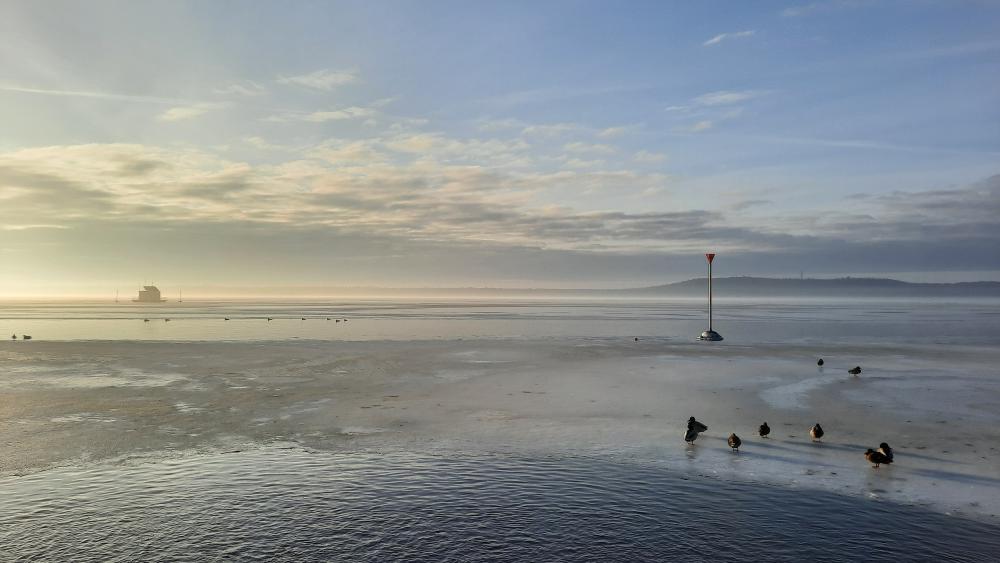
© Caroline Schmunck/IGB
You may have noticed it before reading the first lines: IGB has a new logo. But you will still recognise us – the colours blue and green as well as the characteristic wave have remained. After all, these elements reflect our research work on freshwater ecosystems, their biotic communities and their boundary zones to the surrounding terrestrial environment. Flowing into each other, this symbol also stands for the interdisciplinary cooperation of the now 40 research groups with partners inside and outside the Institute.
New departments with changed foci and new heads
The most important change this year is the restructuring of our research departments, which not only present themselves in a changed formation, but also with new names. “Fortunately, with many new minds there have also come new ideas, expertise and thematic foci to IGB in the last few years. We now want to give them a proper role, with the five departments reflecting the key overarching disciplines in which IGB excels,” explained Luc De Meester, who has been heading IGB for two years now. Two departments have been newly established, such as the department Community and Ecosystem Ecology, led by Sonja Jähnig, and the department Evolutionary and Integrative Ecology, led by Jonathan Jeschke. What drives the two "new ones" and how they would like to shape the work of their departments in the future, you can read in the interviews of the two new department heads:
~ Sonja Jähnig talks about her personal goals, what really everyone should know about freshwaters, and why these systems are often overlooked.
~ Jonathan Jeschke tells why integration is his guiding principle, and how he would like to promote young scientists in particular.
In addition, the former departments Ecohydrology and Chemical Analysis and Biogeochemistry were merged under the department Ecohydrology and Biogeochemistry, headed by Dörthe Tetzlaff. The two former departments Biology and Ecology of Fishes and Ecophysiology and Aquaculture have been merged into the new department Fish Biology, Fisheries and Aquaculture, headed by Jens Krause and Werner Kloas. That integrates IGB’s research on inland fisheries and aquaculture with the fundamental research on the biology of fish. The department Experimental Limnology, based in Neuglobsow and led by Mark Gessner, is now called Plankton and Microbial Ecology to better reflect their unique contribution to IGBs research portfolio.
“The restructuring is an important internal process, which at the same time takes up the recommendations of our Scientific Advisory Board as well as it reflects our new thematic set-up,” explained De Meester. “We bring together different disciplines with the aim of gaining a deeper understanding of freshwater systems and their biota in all their aspects, from their abiotic characteristics to their unique life, from the physiology and behaviour of individuals to entire ecosystems and their role for society. Ponds, lakes, streams, rivers, their floodplains and wetlands are not only vital resources and unique habitats. They are also strongly affected by human activities, climate and environmental change. In order to cope with global challenges such as global warming, water scarcity issues, ongoing urbanisation or the loss of habitats, species and genes, we want to advise policy-makers and society on the basis of excellent scientific findings and support practical application.”
New programme areas foster networking and visibility
IGB is also pursuing its mission with another fundamental change: in the course of the year, new programme areas will be developed that will group all of the Institute's research. “Previously we had departments and cross-cutting research domains. These cross-cutting research domains have successfully contributed to interdepartmental networking and interdisciplinary cooperation. With the new programme areas, we want to strengthen this view on interdisciplinary and interdepartmental collaboration by organizing all our research into new programme areas that will reflect key assets of our research goals. The new programme areas encompass and structure all research at IGB and are intended to enhance the impact and visibility of our findings," said De Meester. Decisive for the choice of topics are therefore societal challenges that seem more relevant in 2022 than ever before and to which IGB feels strongly committed: questions on how to better protect aquatic biodiversity, what consequences to expect from the ongoing loss of biodiversity or how to use and manage water-based ecosystems and resources more sustainably in the Anthropocene. “The programme areas are intended to be incubators for creative ideas and approaches, to foster interdisciplinary research within IGB and with national and international partners, and to develop theme-oriented concepts that will empower the different disciplinary approaches in which the different departments excel,” the director said and added: “While the start of 2022 marks a very visible change, it is clear that change is a continuous process, and there will be a lot more consolidation of these structural changes, progress and strategic development at IGB in 2022 and beyond.”
We wish you a dynamic, exciting and, above all, healthy New Year! Thank you for keeping up with the developments at the Institute, for the excellent collaboration, and for supporting our work.


